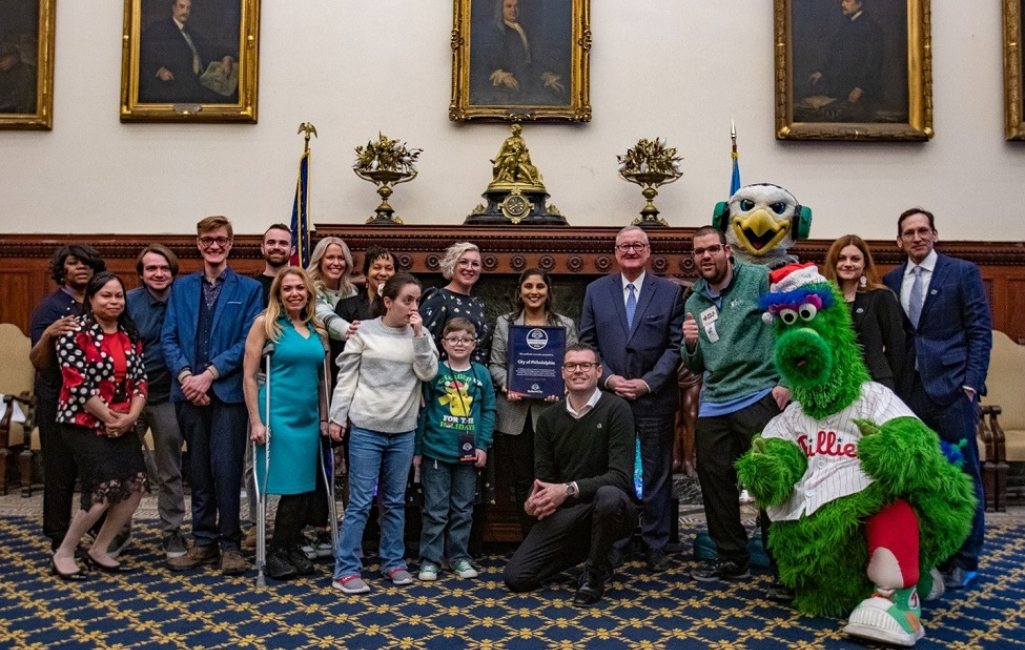According to KultureCity, a nonprofit specializing in sensory sensitivity, about 1 in 6 individuals have a sensory-processing disorder or an invisible disability that can be easily overstimulated by sensory overload. At such a large margin, it’s no wonder that entertainment venues, workplaces and other communal spaces are becoming certified as “sensory inclusive” or “sensory friendly.” But for the first time, an entire city has come together to make their town inclusive to these individuals.
In partnership with KultureCity, Philadelphia has become the first city in the United States to be certified as “sensory inclusive.” The city was presented the prestigious honor in a ceremony in late December supported by actor Stephen Kunken, representatives from Pennsylvania’s professional sports teams and town residents with varying disabilities.
This designation was made possible by the Innovation Fund, which awarded the Mayor’s Office for People with Disabilities a grant to launch the city’s first-ever Sensory Inclusive Project. Philadelphia currently leads the 10 largest U.S. cities with a disability rate of 17%, with many of these disabilities falling under sensory sensitive or invisible. The project’s goal is to provide training and resources to make the city more accessible and understanding of the needs of the disability communities. The project is led by Amy Nieves, executive director of the Mayor’s Office for People with Disabilities, alongside a cross-departmental advisory committee that is working to expand existing accessibility and equity-based policies and programs.
Nieves stated of the program:
“We hope to create a more equitable Philadelphia for our workforce, residents and visitors and create sensory-inclusive environments and engagements across our city by joining KultureCity in making the ‘nevers’ possible.”
The city’s newfound certification was awarded after numerous departments came together to participate in sensory sensitivity training. Over 16,000 City of Philadelphia workforce members across all departments have completed the sensory-friendly training, contributing to creating a more well-informed, inclusive city. Departments that surpass the 50% mark in staff completion are additionally acknowledged as Sensory Inclusive Departments. More than 70% of the city’s workforce are now Sensory Inclusive Leaders, and the numbers continue to grow.
Sensory sensitivities or challenges with sensory regulation are often experienced by individuals with common forms of invisible disabilities such as autism, ADHD and PTSD; however, everyone can experience sensory needs at any time, making the certification beneficial to all who live, visit or work there.
The training included a deepened understanding of the eight senses of the human body and how their intersections interact with everyday life and interactions with disability. Philadelphia will now be better equipped to understand the visual (sight), auditory (sound), olfactory (smell), tactile (touch), gustatory (taste), proprioception (muscular/joints), vestibular (balance and motion) and interoception (internal organs/functions) sensory systems.
“Our communities shape our lives, and to know that the City of Philadelphia is willing to go the extra mile to ensure everyone, no matter their ability, is included in community experiences is amazing,” said Uma Srivastava, executive director of KultureCity.
For the project’s second phase, the city plans to launch a sensory-inclusive lending program in early 2024 to provide sensory bags and three mobile sensory stations for use throughout city departments and community events. The aim is to create a more inclusive environment while ensuring equitable access to city programming for all.
“Philadelphia’s journey to become a certified Sensory Inclusive City is a testament to its commitment to diversity, equity and inclusion in action,” the city stated in their press release. “Philadelphia is better positioned to ensure all visitors, residents and members of its workforce feel welcomed and supported and have more equitable engagement opportunities regardless of how they move their bodies, communicate, use their minds or share their voices. Philadelphia hopes to inspire other cities and communities to follow suit in creating a more inclusive and accessible future. This project and commitment are building blocks in our many efforts to create a safe, accessible and equitable city for all.”
Explore more events for the DIVERSEability community here.



